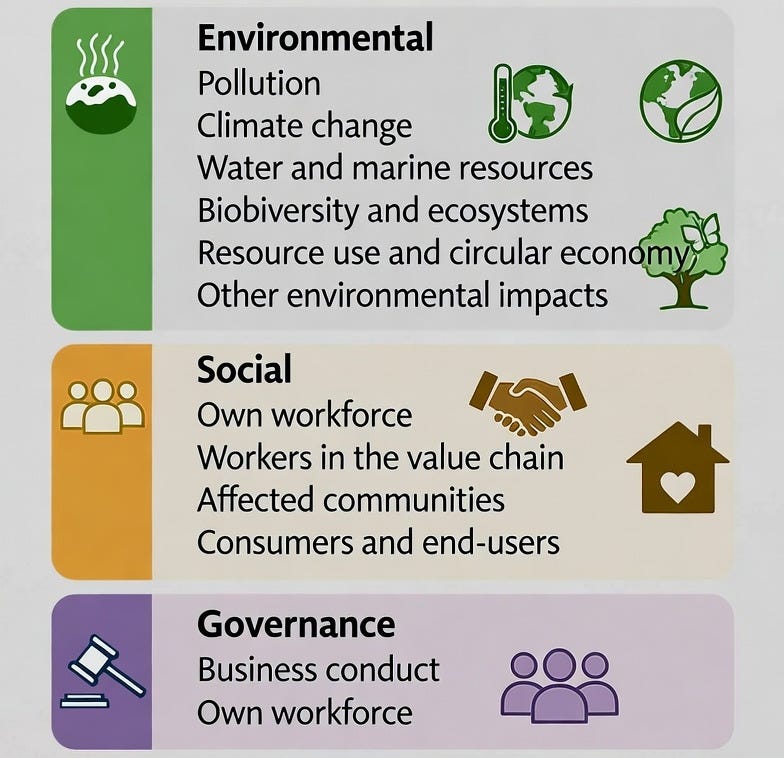American quarter horses are subject to American laws
or also to British and European ones?
I waited patiently and contemplated with excitement as cowboys Jake and Hunter were restocking the hay. “There we go!” said Hunter and he put the final bale on top of our feed pile. “At least we can still do what matters for a ranch and takes care of our animals over here, unlike at Seven Bar.”
“How do you mean?” Jake asked.
“Trust me, they still do cowboy work over there. Only difference to us is that they have doubled their staff. They got four cowboys, a DEI expert, a carbon accountant, a European export administrator and a master in gender studies. Whatever that’s supposed to mean.”
Jake was puzzled. His face already expressed the question before he asked it: “Do they really need all of that at their ranch?”
Hunter was quick to reply: “Work wise, of course not. We don’t think we need it over here and nor do they. But they happen to export their meat to Europe. And … if you wanna do business with European customers, you gotta check all the boxes!”
If that sounds far-fetched, well then, it shouldn’t. Recently, The European Council has introduced two directives: the Corporate Sustainability Reporting Directive (CSRD, 2022/2464) and the Corporate Sustainability Due Diligence Directive (CSDDD, 2024/1760). Directives are European pieces of legislation, the text of which individual countries are required to embed into their own laws within a certain time frame. This process by itself raises the question if the state level representatives are anything more than scribes for the European Commission, since the subject matter of the European directives they are expected to enact is determined without them even being consulted. That said, there is a prerequisite that directives be codified, which leads us to the inevitable outcome that member states will have embedded both CSRD and CSDDD into their national laws by next year.
So what are these two directives about? As their name suggests, both directives are aimed at driving “corporate sustainability.” Both regulations act in tandem: whereas the CSRD is focused on mandatory “sustainability” reporting for corporations of a certain size, the CSDDD is concerned with how corporations should act to improve their “sustainability” footprint, i.e. through “due diligence.” “Sustainability reporting” may sound great to some, but many business leaders will immediately think of “administrative burthen” when they hear the word “reporting.” They would be correct: the CSRD prescribes a wide variety of reports corporations will have to file if they want to do business in the European Union. Big consultancy firms seem to revel in the CSRD, since the new directive creates a market out of thin air for consulting corporations on how to comply.
Before diving into the content, it is already safe to assume that CSRD will generate administrative overhead. It is a typical directive created by bureaucrats for the sake of bureaucracy, that ensures that other bureaucrats will be employed by corporations or their contractors for performing bureaucracy. However, the subject matter of what needs to be reported is just as unnecessary. The CSRD prescribes that corporations have to report a set of “non-financial results,” which are characterized into a collection of “European Sustainability Reporting Standards” (ESRS), that fit into three overarching classes: environmental, social and governance standards.

Indeed, their names don’t lie: in fact, CSRD and CSDDD don’t merely want to nudge corporations to write an annual sustainability report. These directives are intended to mandate them to implement ESG, which we have reported on before. The “reporting standards” in CSRD are about much more than “sustainability:” in fact, they are aimed at enforcing the full spectrum of ESG reporting and by consequence, each of its often dubious practices. For instance, the category “climate change” encompasses nonsensical carbon accounting, which beyond being entirely arbitrary, would do nothing to save the planet even if there really were a “climate emergency.” The standard on “biodiversity” will e.g. report which corporations still work with Dutch farmers who fail to cull 90% of their cattle for the sake of arbitrary ecosystem regulations.
Just as pernicious as the “environmental” reporting required in CSRD, are the “social” and “governance” standards. Corporations will need to report the ethnic composition of their board, whether they have a “diversity, equity and inclusion” (DEI) initiative and how big it is, or if they consider “characteristics” instead of skills when they hire or promote employees, just to name a few. “Good” governance is reflected by having a board that increases its own bonus when the company implements DEI.
CSRD by itself already imposes a huge reporting burthen, but it does not take action against corporations that don’t implement its climate and DEI objectives. Those who had thought that that would be the end of the road, would be mistaken, though. That is exactly where the CSDDD comes in. As the “DD” in its name suggest, CSDDD requires that corporations perform “due diligence” regarding the “sustainability” of their operations. Hefty fines will be imposed on corporations that fail to do so. “Due diligence on sustainability” may sound good, but what it entails in practice, is that corporations of a certain size are now legally required to implement ESG. If one thought that CSDDD is only about making it very difficult for corporations to dump cyanide into rivers or engage in slave labour, one would be terribly mistaken again. The below excerpt is a good muster of the entire text and is riddled with buzzwords that aim to codify identity politics (and bear no relation to sustainability):
“Depending on the circumstances, companies may need to consider additional standards. For instance, taking account of specific contexts or intersecting factors, including among others, gender, age, race, ethnicity, class, caste, education, migration status, disability, as well as social and economic status, as part of a gender- and culturally responsive approach to due diligence, companies should pay special attention to any particular adverse impacts on individuals who may be at heightened risk due to marginalisation, vulnerability or other circumstances, individually or as members of certain groupings or communities, including indigenous peoples, […]
EU CSDDD, clause (33)
Anyone who reads this may already conclude that the situation is very bad for European companies. But one may also find comfort in the fact that most of the planet is outside Europe anyway, right? Well, as bad as the above already is, there is worse news. The CSDDD does not only apply to European corporations. It applies to any corporation that meets the size requirement. Many North American corporations have subsidiaries in the EU that are large enough to surpass the CSDDD threshold. But it gets even worse. Not only does the CSDDD require corporations to perform “due diligence” on their own operations, but also along their entire value chains. In plain terms, that means that corporations should also consider the CSRD ESG reports from the companies they intend to buy their raw materials from. Doing so will be difficult if the supplier does not file one. Therefore, when no action is taken, the outcome of the CSDDD may very well be that implementing ESG malarkey is the only option left for any company in the Americas, Asia, Oceania or elsewhere, if it wants to make a sale in Europe. In fact, consulting firm PwC estimates that thousands of American companies will have to comply with the CSDDD. De facto, the CSRD and CSDDD are legal instruments that attempt to forcibly export the European Commission’s moral bankruptcy across the planet.
Much of the West is presently returning to its senses. Particularly in the United States, ESG is now largely seen as a failed experiment. When pressure from shareholders with large shares of votes and possible upcoming regulation from the Securities Exchange Commission (SEC) was pushing corporations into implementation of ESG in the 2020-2024 span, that pressure has now largely receded and there is a wide consensus in business circles that its effects were disastrous. To us at Wild Horse Wisdom it seems strange that the experiment was run at all, since it was pretty obvious from the beginning that the outcome would be extremely negative.
In spite of the now acknowledged disastrous effects of ESG, the European Union seems to have the arrogance to try and impose it on the rest of the world. Instead of fulfilling their legal requirement to shareholders of maximizing profit, American companies will be required to waste money on extensive carbon accounting that has no impact on climate and on corporate DEI departments that create toxic work environments. They will also be required to prefer characteristics over skills, mental delusion over sanity, diversity of skin colour over diversity of opinion and social division over cohesion, all of which will inevitably lead to a continued drop in productivity and profit. No wonder, if it becomes more important for running a business to fire those who do not want to be told that they are “toxic” for being born white, male or both, or those who fail to “affirm” the last batch of “pronouns” invented by a colleague with severe mental conditions, then the business will fail to focus on its core activities and perform badly.
One could argue what the worst aspect of the CSDDD is: the fact that it mandates ESG insanity, or that it pretends to be of effect in countries outside Europe? The latter is unheard of, but lamentably, the CSDDD does not stand alone in that respect. The British Office of Communications (Ofcom), which has regulated media broadcasting for decades, recently gained power over the UK’s internet when the Online Safety Act was ratified. Like many mirroring proposals in other jurisdictions, the Online Safety Act was introduced to the public by abusing the emotional appeal of “protecting children online” to effectively turn Ofcom into the authority that can determine allowable online expression. An issue that Ofcom faces when it attempts to enforce the Online Safety Act, though, is that there are many online platforms that have users in the United Kingdom, but are not based there. However, Ofcom does not see that as a hurdle. Recently, it threatened US-based platform 4chan with a £20000 per day fine if it failed to implement speech restrictions dictated by them. Being a company that explicitly embraces free speech, the platform of course resisted. Ofcom then returned a letter, stating that the First Amendment does not apply to US companies based in the United States:
“We also note 4chan’s claim that it is protected from enforcement action taken by Ofcom because of the First Amendment to the US Constitution. However, the First Amendment binds only the US government and not overseas bodies, such as Ofcom, and therefore, it does not affect Ofcom’s powers to enforce the Act in this case.”
Ofcom letter to 4chan
The conclusion to draw from both the CSDDD and the Online Safety Act is quite clear: US law does not seem to apply to American individuals or American companies inside the United States, but British and EU laws somehow do. Of course, this is nonsense and any US administration that has even a modicum or common sense or patriotic sentiment, cannot let these stand. Statements about these countries being “allies” should be readily dismissed. Any country that claims to have legal authority over another is not the other’s ally, but rather a colonial power. As both of these foreign laws have effect on US sovereign territory, they should be seen as territorial claims and thus: as acts of war. It is up to the present US administration to treat them as such.
An inevitable step in the global return to reason is a return to respect for territorial sovereignty. If left unmitigated, the present situation will spiral out of control. Because each country has its own interests, letting countries enact laws that have effect on other countries’ territory will inevitably lead to conflicting legal claims and leave corporations vulnerable to lawsuits, regardless of what they do. To some extent, we are already there: US corporations subject to CSDDD may face fines in the EU when they don’t implement economically destructive ESG nonsense, but they may also face litigation in the United States when they do implement it and fail to maximize profit. One can only imagine what will happen when more countries start making extraterritorial claims. For instance, what if China enacts laws that mandate corporate boards to be composed of 100% Han Chinese, subject corporations to penalties if they fail to establish a “Communism, Mao and Chinese Greatness Board,” or if they fail to censor criticisms of Xi Jinping, Vladimir Putin or their allies. As long is different countries exist, they will have divergent opinions and interests. The only way to make collaboration work, is by mutually respecting territorial sovereignty. The US is perfectly positioned to lead the way and undo British and European arrogance for a second time in a quarter millennium.

Only a week later we heard that Seven Bar had reverted to their old ways. In fact, the DEI “expert” was fired on his first day, for shouting at rancher Prentice that he “fostered a culture of toxic masculinity and Prentice was the icon of it himself.” The carbon accountant followed suit soon, when the ranchers discovered that she wanted to cut meat from the lunch boxes. Prentice had come to the logical conclusion: our domestic market for meat is big enough.



When Australia's "e-Safety Commissioner" (read: chief censor) Julie Inman Grant was summoned by the US Congress, her reply was that "I’m answerable to the communications minister here and to the Australian parliament, and not to the US Congress:"
https://reclaimthenet.org/us-congress-summons-australias-censor
Yet she is suing social media company X for not having deleted certain content globally, i.e. not only for Australian, but also for American users. The latter is of course a flagrant violation of the First Amendment.
Here we have yet another foreign entity that thinks that its own laws apply on US soil, but American laws do not. The US cannot tolerate such behaviour and it is up to the State Department to take action. Such action needs to be swift and drastic.
Responding to pressure from their own corporations, as well as several national governments, the EU parliament has now voted to "scale back" the ESG mandate cloaked as "sustainability due diligence." It will now only apply to corporations with revenue over 1.5 billion EUR:
https://www.theepochtimes.com/world/eu-votes-to-scale-back-corporate-sustainability-rules-5944153?ea_src=frontpage&ea_med=section-2
This is not enough. There are many US corporations with revenue over 1.5 billion that are active in the EU. According to CSDDD, they will be mandated to implement ESG nonsense themselves. But they will also have to do "sustainability due diligence" to their suppliers and contractors, which means in plain terms to not do business with them unless they also implement ESG baloney. Therefore, even in its reduced form, many US corporations will be affected and will need to waste resources on ESG malarkey. Diplomacy has to continue until CSRD and CSDDD are rescinded integrally.